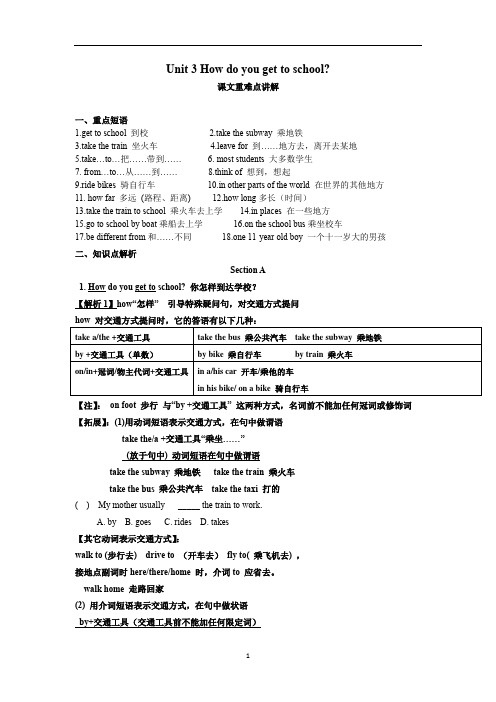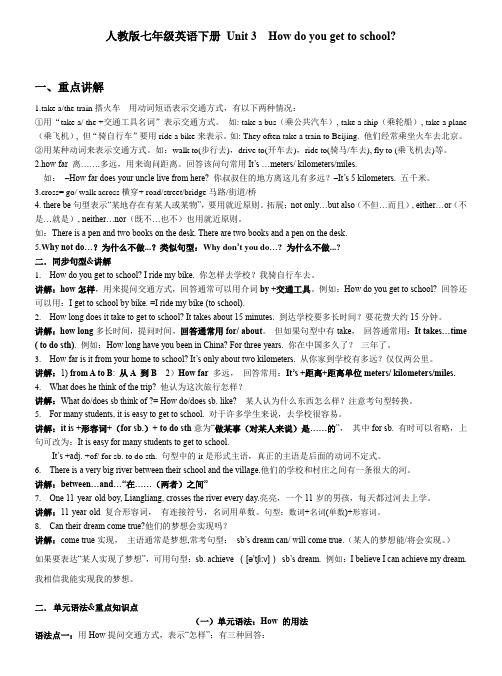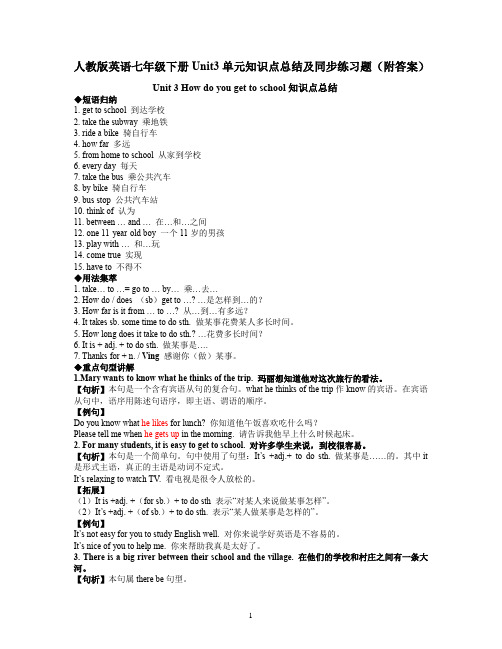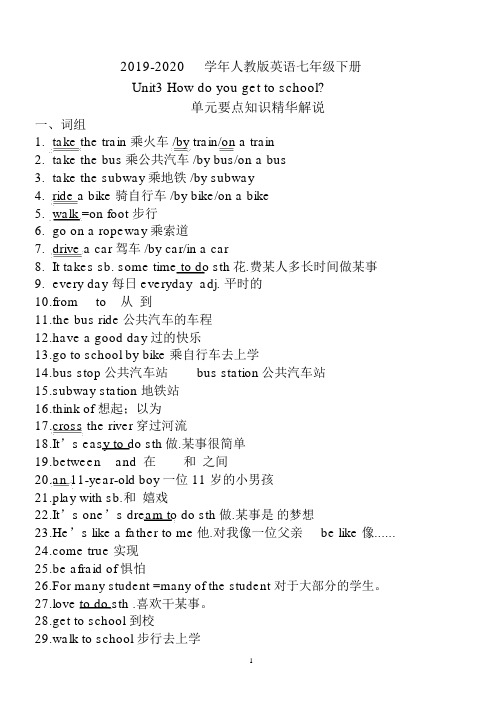新人教版英语七年级下Unit3 重难点详解 练习
unit3重难点讲解及练习人教版英语七年级下册

Unit 3 How do you get to school?课文重难点讲解一、重点短语1.get to school 到校2.take the subway 乘地铁3.take the train 坐火车4.leave for 到……地方去,离开去某地5.take…to…把……带到……6. most students 大多数学生7. from…to…从……到…… 8.think of 想到,想起9.ride bikes 骑自行车10.in other parts of the world 在世界的其他地方11. how far 多远(路程、距离) 12.how long多长(时间)13.take the train to school 乘火车去上学14.in places 在一些地方15.go to school by boat乘船去上学16.on the school bus乘坐校车17.be different from和……不同18.one 11-year old boy 一个十一岁大的男孩二、知识点解析Section A1. How do you get to school? 你怎样到达学校?【解析1】how“怎样” 引导特殊疑问句,对交通方式提问【注】:on foot 步行与“by +交通工具” 这两种方式,名词前不能加任何冠词或修饰词【拓展】:(1)用动词短语表示交通方式,在句中做谓语take the/a +交通工具“乘坐……”(放于句中) 动词短语在句中做谓语take the subway 乘地铁take the train 乘火车take the bus 乘公共汽车take the taxi 打的( ) My mother usually _____ the train to work.A. byB. goesC. ridesD. takes【其它动词表示交通方式】:walk to (步行去) drive to (开车去)fly to( 乘飞机去) ,接地点副词时here/there/home 时,介词to 应省去。
Unit 3 单元话题满分范文必背-七年级英语下册单元重难点易错题精练(人教版)

Unit 3 How do you get to school?单元话题满分范文必背1.英语写作课上,大家对平时选择哪种交通方式上学进行了讨论。
有人选择坐公共汽车,有人选择走路,有人由父母开车接送……假如你叫高琳,你平时喜欢走路上学。
请你以“My Ways to Go to School”为题,根据以下提示写一篇英语短文,说明走路上学的原因及益处。
写作提示:1.家离学校不远;2.走路上学是锻炼的好机会;3.可以欣赏沿途的风景(scenery);4.和朋友一起走路很有趣。
写作要求:1.语句通顺,条理清晰,详略得当,书写工整;2. 100词左右,题目和开头已给出,不计入总词数。
My Ways to Go to SchoolI usually go to school on foot.___________________________________________________________________________________________ ___________________________________________________________________________________________ ___________________________________________________________________________________________ ___________________________________________________________________________________________ ___________________________________________________________________________________________ ___________________________________________________________________________________________ ___________________________________________________________________________________________ ___________________.【答案】参考范文:My Ways to Go to SchoolI usually go to school on foot. My home is not far from school. It takes me about twenty minutes to walk to school every day. I think walking is good for me. First of all, it’s a good way to exercise. I’m busy studying and have little time to do sports, so walking to school is a perfect chance to take exercise. Next, when I walk, the scenery along the way changes every moment, and I can enjoy it. What’s more, it’s fun to walk together with my friends every day. We can talk about something interesting and know each other better. I hope more and more students will enjoy going to school on foot.【详解】1.题干解读:该题目属于话题作文。
Unit3重难点讲解与练习人教版七年级英语下册

人教版七年级英语下册Unit 3 How do you get to school?一、重点讲解1.take a/the train搭火车用动词短语表示交通方式,有以下两种情况:①用“take a/ the +交通工具名词”表示交通方式。
如: take a bus(乘公共汽车), take a ship(乘轮船), take a plane (乘飞机), 但“骑自行车”要用ride a bike来表示。
如: They often take a train to Beijing. 他们经常乘坐火车去北京。
②用某种动词来表示交通方式。
如:walk to(步行去),drive to(开车去),ride to(骑马/车去), fly to (乘飞机去)等。
2.how far 离…….多远,用来询问距离。
回答该问句常用It’s …meters/ kilometers/miles.如:–How far does your uncle live from here? 你叔叔住的地方离这儿有多远?–It’s 5 kilometers. 五千米。
3.cross= go/ walk across横穿+ road/street/bridge马路/街道/桥4. there be句型表示“某地存在有某人或某物”,要用就近原则。
拓展:not only…but also(不但…而且), either…or(不是…就是), neither…nor(既不…也不)也用就近原则。
如:There is a pen and two books on the desk. There are two books and a pen on the desk.5.W hy not do…?为什么不做...?类似句型:Why don’t you do…? 为什么不做...?二.同步句型&讲解1.How do you get to school? I ride my bike. 你怎样去学校?我骑自行车去。
人教版英语七年级下册Unit3单元知识点总结及同步练习题

人教版英语七年级下册Unit3单元知识点总结及同步练习题(附答案)Unit 3 How do you get to school知识点总结◆短语归纳1. get to school 到达学校2. take the subway 乘地铁3. ride a bike 骑自行车4. how far 多远5. from home to school 从家到学校6. every day 每天7. take the bus 乘公共汽车8. by bike 骑自行车9. bus stop 公共汽车站10. think of 认为11. between … and … 在…和…之间12. one 11-year-old boy 一个11岁的男孩13. play with … 和…玩14. come true 实现15. have to 不得不◆用法集萃1. take… to …= go to … by… 乘…去…2. How do / does (sb)get to …? …是怎样到…的?3. How far is it from … to …? 从…到…有多远?4. It takes sb. some time to do sth. 做某事花费某人多长时间。
5. How long does it take to do sth.? …花费多长时间?6. It is + adj. + to do sth. 做某事是….7. Thanks for + n. / Ving 感谢你(做)某事。
◆重点句型讲解1.Mary wants to know what he thinks of the trip. 玛丽想知道他对这次旅行的看法。
【句析】本句是一个含有宾语从句的复合句。
what he thinks of the trip作know的宾语。
在宾语从句中,语序用陈述句语序,即主语、谓语的顺序。
【例句】Do you know what he likes for lunch? 你知道他午饭喜欢吃什么吗?Please tell me when he gets up in the morning. 请告诉我他早上什么时候起床。
人教版七年级下册知识点总结及习题Unit 3重难点

1. How do you get to school? I ride my bike to school./I get to school by bike.你怎么到校?我骑自行车到校。
2. How does she/he get to school? She/He usually takes the bus to school.他/她怎么到校?她/他通常乘公交车到校。
3. How long does it take (him) to get to school? It takes (him) about an hour (to get to school).他要花费多长时间到校?他到校要花费一个小时4. How far is it from your home to school? It’s only about two kilometers.从你家到学校有多远?仅仅2公里。
5. How far do you live from school? I live about five kilometers from school.你住在离学校多远的地方?我住在离学校5公里远的地方。
6. Does Jane walk to school? No, she doesn’t. She goes by bike.简走路去上学吗?不,她不是。
她骑车去上学。
7. Do they take the bus to school? No, they don’t. They walk.他们乘公交车去学校吗?不,他们不是。
他们走路去上学。
8. The bus ride takes about 20 minutes.乘公共汽车大约需要20分钟。
9. What do you think of your math teacher?你认为你的数学老师怎么样?10. Mary wants to know where Bob lives.玛丽想知道鲍勃住哪。
人教版英语七年级下册Unit3Howdoyougettoschool单元重点知识精炼讲解

2019-2020学年人教版英语七年级下册Unit3 How do you get to school?单元要点知识精华解说一、词组1.take the train 乘火车 /by train/on a train2.take the bus乘公共汽车 /by bus/on a bus3.take the subway乘地铁 /by subway4.ride a bike 骑自行车 /by bike/on a bike5.walk =on foot 步行6.go on a ropeway乘索道7.drive a car驾车 /by car/in a car8.It takes sb. some time to do sth花.费某人多长时间做某事9.every day 每日everyday adj. 平时的10.from to从到11.the bus ride公共汽车的车程12.have a good day过的快乐13.go to school by bike 乘自行车去上学14.bus stop公共汽车站bus station公共汽车站15.subway station 地铁站16.think of 想起;以为17.cross the river穿过河流18.It’s easy to do sth做.某事很简单19.between and在和之间20.an 11-year-old boy一位 11 岁的小男孩21.play with sb.和嬉戏22.It’s one’s dream to do sth做.某事是的梦想23.He’s like a father to me他.对我像一位父亲be like 像......e true 实现25.be afraid of 惧怕26.For many student =many of the student 对于大部分的学生。
27.love to do sth .喜欢干某事。
人教版七年纪下unit3教案详解语法重点及课后练习附答案汇总

人教版七年纪下unit3教案详解语法重点及课后练习附答案汇总Unit 3 How do you get to school?本讲知识清单:Important words & phrasesImportant sentencesGrammar本讲重点:Important sentences & Grammar教学建议1. 课时:2小时2. 上课安排:本讲内容包含3个小章节:重点单词和词组;重点句子和语法。
老师在上课时,可以根据学生情况调换章节顺序来讲解教学建议单元重点单词:Take, need,live,hundred,minute,stop, cross, between,afraid,等单元重点短语:how about,leave for,how far,get to,think of 等1. 本章节涵盖了3个板块:单词,重点词组和课文重点词组。
2. 单词板块:讲解时主要以单词拆分记忆法&词的前后缀等方面来帮助学生记忆,同时,注重词性、词形的变化、词义的延伸和拓展、近义词汇的辨析、相关的固定搭配等。
3. 重点词组板块:挑出本单元重点短语进行精讲。
4. 课文重点词组板块:建议老师以抽查的形式,检验学生的背诵情况和掌握情况,同时,可以将不会的词组打钩,课后让学生继续巩固加强。
单词·巧记·典句·考点1. take [teik] v.乘坐;花费;买,拿走;带去【巧记提示】ta+ke【经典例句】1)you can take the bus to the hospital.你可以做公交车去医院2)How long does it take you to get home? 你到达家里要花多长时间?3)It’s cheap,I will take it. 它很便宜,我要买了。
4)Take your book to school tomorrow.明天把你的书带去学校【考点聚焦】take作“乘坐”时,常构成结构:take the bus/subway/train/boat/bike/taxi to+地点。
人教版初中英语七年级下册Unit 3 A 知识点讲解与练习

人教版初中英语七年级Unit 3 How do you go to school? A 知识点讲解与练习A 知识讲解一、交通方式的表达法1. take/ride+限定词(冠词,形容词性物主代词)+交通工具。
如:take a / the ropeway; take his / her / my car ; ride his bike2.take the/a +交通工具to...=get/go to...+ by +交通工具乘...去= get/go to... in +修饰语+car/taxion + 修饰语+bus /train/plane/subwayeg:1)他经常乘地铁上班。
He often takes the subway to work.=He often goes to work by subway.=He often goes to work on the subway.4. 动词+ to+地点名词,常用的动词有walk, run, ride, drive, fly等。
walk to ... 走着去drive to...开车去fly to... 飞往ride to...骑车去① He _____ ____ _______ ________(想骑车去)his friend’s home.② My mother often ______ _____ _____.步行去上班。
③ Mr. King______ _____ _____.跑步去上班。
注意:动词后若直接接地点副词(here, there, home,upstairs, downstairs),介词to要省略。
She______ _____ (步行回家)from work every day.二、how long, how far, how often的区别1. how long ①时间多久,主要对一段时间提问(for+一段时间,half+一段时间,three days, four weeks等)。
- 1、下载文档前请自行甄别文档内容的完整性,平台不提供额外的编辑、内容补充、找答案等附加服务。
- 2、"仅部分预览"的文档,不可在线预览部分如存在完整性等问题,可反馈申请退款(可完整预览的文档不适用该条件!)。
- 3、如文档侵犯您的权益,请联系客服反馈,我们会尽快为您处理(人工客服工作时间:9:00-18:30)。
*1‘000’000‘000
billion thousand million ndred
two hundred 200 five thousand 5'000 twenty thousand 20'000 1'000'000 a million
hundreds of thousands of millions of billions of
1000米 60千米 30克 2000克
1.My brother will take part in _______. A.the boys'300 meter race B.the boys'300-meters-race C.the boys'300-meter race D.the boy's 300-meter-race 2.The boys are good at running.They will take part in the____race. A.boy's 400-meter B.boys' 400 meters' C.boys' 400-meters D.boy's 400-meters 3.My brother is an_________. A.one-year-old boy. B.eight-year-old boy. C.seven-year-old boy. D.eleven years old boy. is I think two hours of TV ____(be) enough for you! is How time flies! Three years _______(be) really a short time. is (be) a lot of money. 500 dollars _____ are There _______(be) two kilos of apples in the bag. is (be) very heavy. Two kilos of apples _______ 表示时间、距离、金额、度量等词语作主语时,通常被视作整体,谓语动词用 单数形式。
*How long does he take to get home? About twenty minutes. How far he lives from school? About 2 kilometers. How often do you have dancing class? About twice a week. How old/many/much.....? *everyday vs every day
adj. 作状语
We go to school every day. 我们每天上学。 Mathematics is a part of everyday life. 数学是日常生活的一部分。 It is necessary for us to go to school every day to learn everyday English. 我们有必要每天上学学习日常英语。
新人教版七年级下Unit3
How do you get to school?
主讲:Ivy
Words and Expressions
How get home? * do you get to school? I get to school on foot / by bike/car/bus/subway. I go to Shanghai by train/plane(air)/ship(water/sea).
*stop n./v. stop
bus stop
停下来去做某事 停下正在做的事
bus station
{
to do doing
The students stopped to read when the teacher came in. The students stopped reading when the teacher came in.
*
*think of / about / over think about和think of这两个短语表示“考虑”、“对……有某种看法”时,可以互换。 例如: Don't think of(about)me any more. They're thinking about(of)buying a new car. What do you think of(about)the film? think of表示下列意义时,一般不和think about换用: ①想要;打算。例如: Helen,are you thinking of marrying Tom? ②想出;想到。例如: Who thought of the idea? ③关心;想着。例如: Lei Feng was always thinking of others. ④想起;记得。例如: I can't think of his name. think about表示“回想过去的事情”、“考虑某计划是否切实可行”时,一般不和 think of换用。例如: I often thought about what you said. I'll think about your suggestion,and give you an answer tomorrow. think over意为“仔细考虑”。例如: Think over,and you'll find a way. We need several days to think this matter over.
millionaire
*meter gram
500米
billionaire
millimeter kilometer centimeter kilogram milligram
five hundred meters one thousand meters=one kilometer sixty kilometers thirty grams two thousand grams=two kilograms
1.How does he go to Hong Kong? A.take the plane B.take plane C.By the plane D.By the air 2.I usually go to school_________. A.ride the bike B.on bike C.on the bike D.by my bike 3.How do you usually go to school? ________my mother's car. A.By B.With C.In D.For 注:用by时注意:by后面直接加交通工具。 而on / in 等要先加修饰词,再加交通工具。 如 by bike = on a/the bike by car = in a/the car
I take a train to Shanghai. I walk to school. I take a plane to Shanghai. I ride a bike to school. I take a ship to Shanghai. I drive a car to school. I take a bus/subway to school.
